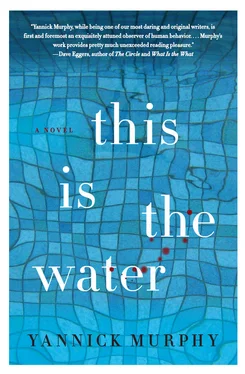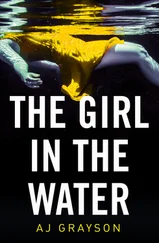She wasn’t my girl. She was just a girl I met at a coffee shop. She didn’t wear shorts and a tee shirt, or jeans, or slacks. She wore a nurse’s uniform and nurse’s shoes and she smelled, ever so slightly, of rubbing alcohol. Her fingertips were dry and her nails clipped short to protect herself, because some patients she had known had gripped her hand so hard and pressed it into a fist so tight that her own nails cut her. She showed me some half-moon scars on the palm of her hand, proving it was true.
When I asked, she said she would go on a ride with me because it was such a nice day. I didn’t know then that it would be the last ride she’d ever take. She suggested the place, a rest stop up north, a good drive from where we were.
It sounds strange to say that our first and only date was at a rest stop. It was one she said Vietnam veterans came to because the view from the hill above the rest stop looked just like the hills and lush valleys of the jungle, and they were sent back in time when they saw it. They were happy to go back, she said. Being back, they didn’t feel the guilt, because it was as if no time had passed and there hadn’t been time to let the guilt soak in. Being back, they had to think about protecting themselves again, and for so long they had been bent on destroying themselves. She made me close my eyes and listen. I heard an owl whose screech sounded like a woman’s voice. I smelled what I thought was rice cooking. When I opened my eyes she was kissing me. We were sitting on a picnic table with names carved into the top, and I laid her across those names. She wasn’t shy. She guided me into her and up from her body came a smell different from the rubbing alcohol. It was more like the smell of wood smoke mixed with steam. When we were done, she smiled. “Wait for me. I’ve got to use the restroom,” she said.
I watched her walk down the hill easily. Those nurse’s shoes have to be good for walking back and forth across those endless hospital hallways, I thought. She turned around once while she was on the path, and waved up to me. I waved back and then I looked to the hillsides. The sun was going down and the hills looked blue. The air was still warm and hot, though. A fly was intent on buzzing close to my head even though I waved it away several times, so I gave up and imagined I was one of those vets back in Nam. The owl screech this time really did sound like a woman’s scream, and when I opened my eyes I expected to see some scene unfolding in front of me where I was with other soldiers in a village, and before us was a woman begging for her life.
You would keep on reading, but the killer stops the car. You look around and realize that there is nothing but trees lining the dirt road. The trees are close together, with no fields or open spaces in sight, and certainly no houses. The killer looks at you. You try not to think of all the women he has killed, but when you look at him you see the face of Bobby Chantal, the same face that you once saw in the paper after Kim’s death. You also see Kim’s face. “Please, let me go,” you say in a voice that is a whisper. You are so scared.
“Why, when you read so well?” he says. “You must have children. They must have loved the sound of you reading to them when they were little.” He is not looking at you any longer, he is looking down at his knife. “Did you and that friend of yours really think she could catch me?”
“No, no, I had no intention of catching you. I don’t want to catch you,” you say, your voice higher now than before. What can you say to make him believe you?
“The story you are reading,” he says. “Who wrote it? Someone you know? You must answer me. I have the knife.” He puts the tip of the knife on your knee, moving it as if he’s spelling out small letters or drawing short lines. He is not pressing hard enough to break the cloth of your jeans. He is pressing as if what he is doing he is doing absentmindedly.
“I know him,” you manage to say.
He nods. “Tell me more,” he says.
You are suddenly very cold. With the engine off, you can hear the wind rustle the leaves outside and whip around the car, making it move from side to side.
“There’s not much to tell,” you say. “This man, it’s the husband of the woman who, who owns this car. The woman who went into the bathroom at the rest stop.”
The killer nods. “I’d like for you to finish the story for me,” he says.
“You can have the story. Take the story. Just let me go. Let me get back to my children.” You hold the papers out toward him. He doesn’t take them. He doesn’t even look at them.
“It wouldn’t be the same,” he says. “Go on reading.” He’s been using the tip of his knife on your knee the whole time he’s been talking.
You wonder if you could say, No, not unless you throw the knife out the window and keep driving. You want out of the woods. Even if he did let you out of the car, you’d be miles from a major road. He could probably run you down. You are a poor runner. Your legs are not long, your stride is short, your feet always sore from bunions that are red and swollen at night when you take off your shoes and socks, causing Thomas to shake his head and say how awful they look. “You know the rest of the story,” you say. “You were there.”
When he jabs the blade of his knife through the top of your leg you draw your leg up into yourself. The pain is so strong it makes you see colors. You see white and then red and then black. You hope you have blacked out, but you are still feeling the pain. You still hear his voice. It’s excited now. “Read it to me,” he says. Then you see his face, sweat beginning to form, showing up first as just a shiny layer of water on his skin, and then pooling in the creases of his forehead. You try to stop the blood with your hand. Everything’s running down now — tears running down your face from the pain, the blood running down the sides of your leg and soaking into your jeans, his sweat starting to drip from his temples. “Please, don’t kill me,” you say, and you are reminded again of how silly it must sound, as if you were talking to a lion. You think how running now is very much out of the question. You cannot even bend your knee without the colors of pain flashing again before your eyes.
The rest of the story strikes you as not so good. The rest of the story is about Paul finding Bobby Chantal’s body and turning her over and seeing her head hanging far over backward, which reminds Paul of an open Pez dispenser, the toy he had as a kid ready to spit out its candy. You bet that if Paul’s own students saw that metaphor in workshop, they’d be all over it, pointing out how it was incongruous. How was anything having to do with candy supposed to be compared with the atrocity of Bobby Chantal being murdered so horribly, with so much blood on her body and on her face that in the dark it looked as if she had been burned in a fire, her skin and clothes now char? The story, you realize, cannot save your life at all. The killer doesn’t like the story either. He shakes his head. “Who is this guy?” he asks when you’re done reading. “Bigwig writing professor,” you say, breathy, because your leg is now throbbing and you’re considering ripping your jeans to take the pressure off the wound that’s swelling. “Not so good a writer, is he?” says the killer. “He must be good-looking. That’s why your friend married him. Just for looks.” You shake your head. You really don’t know. “Well, is he good-looking?” the killer asks. You nod.
“Yeah,” you say.
“I’ve never killed a man,” he says. You don’t have a response for that one. Are you supposed to say, “Hey, let’s try killing one now?” so that the killer forgets about you and moves on? If you said, “I know you only kill women who are weaker than you,” then would he kill you for saying it?
Читать дальше












